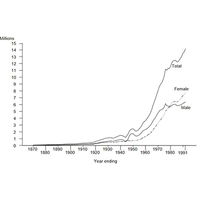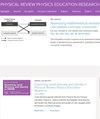Historical analysis of innovation and research in physics instructional laboratories: Recurring themes and future directions
IF 2.6
2区 教育学
Q1 EDUCATION & EDUCATIONAL RESEARCH
Physical Review Physics Education Research
Pub Date : 2023-12-20
DOI:10.1103/physrevphyseducres.19.020168
引用次数: 0
Abstract
[This paper is part of the Focused Collection on Instructional labs: Improving traditions and new directions.] Physics instructional labs have long been an area of pedagogical innovation and educational research. While current stakeholders in instructional labs are undoubtedly aware of the day’s concerns, reform efforts, and empirical research within lab settings, likely less apparent are the deep-rooted connections today’s deliberations have with those from multiple educational eras across the last 200 years. To this end, this paper provides a historical analysis of instructional laboratories in undergraduate physics education in the United States, with the goal of elucidating recurring themes in educational reform and research aimed at improving these learning environments. This work aims to synthesize the recursive themes present in the instructional laboratory landscape while summarizing how new research and pedagogical trends can promote further growth in this important learning environment. Through this analysis, commonly recurring themes are identified related to the longitudinal criticism of confirmatory, “cookbook” lab structures, the community’s skepticism of instructional labs’ abilities to reinforce lecture content, and the possibility of technological and societal obstructions which may implicitly limit innovative ideas, pedagogy, and research. By bringing to light these latent recursive themes, this work hopes to work toward helping break the cycle of criticism and stifled innovation alongside recent positive movements in evidence-based reforms and promising empirical research into student learning and engagement in instructional labs.

物理教学实验室创新与研究的历史分析:反复出现的主题和未来方向
[本文是 "教学实验重点文集 "的一部分:改进传统和新方向]。长期以来,物理教学实验室一直是教学创新和教育研究的一个领域。尽管目前教学实验的利益相关者无疑都知道当今的关注点、改革努力和实验室环境中的实证研究,但可能不太明显的是,今天的讨论与过去 200 年中多个教育时代的讨论有着根深蒂固的联系。为此,本文对美国本科物理教育中的教学实验室进行了历史分析,旨在阐明旨在改善这些学习环境的教育改革和研究中反复出现的主题。这项工作旨在综合教学实验室景观中反复出现的主题,同时总结新的研究和教学趋势如何促进这一重要学习环境的进一步发展。通过分析,我们发现了一些常见的反复出现的主题,这些主题涉及对确认性、"教科书式 "实验室结构的纵向批评,社会对教学实验室强化讲课内容能力的怀疑,以及可能暗中限制创新思想、教学法和研究的技术和社会障碍。通过揭示这些潜在的递归主题,这项工作希望能够打破批评和创新被扼杀的恶性循环,同时打破最近在基于证据的改革中出现的积极动向,以及对学生在教学实验室中的学习和参与情况进行的充满希望的实证研究。
本文章由计算机程序翻译,如有差异,请以英文原文为准。
求助全文
约1分钟内获得全文
求助全文
来源期刊

Physical Review Physics Education Research
Social Sciences-Education
CiteScore
5.70
自引率
41.90%
发文量
84
审稿时长
32 weeks
期刊介绍:
PRPER covers all educational levels, from elementary through graduate education. All topics in experimental and theoretical physics education research are accepted, including, but not limited to:
Educational policy
Instructional strategies, and materials development
Research methodology
Epistemology, attitudes, and beliefs
Learning environment
Scientific reasoning and problem solving
Diversity and inclusion
Learning theory
Student participation
Faculty and teacher professional development
 求助内容:
求助内容: 应助结果提醒方式:
应助结果提醒方式:


